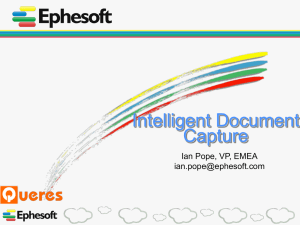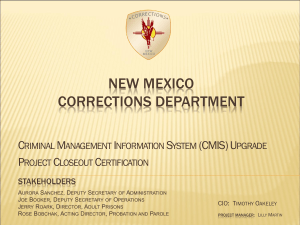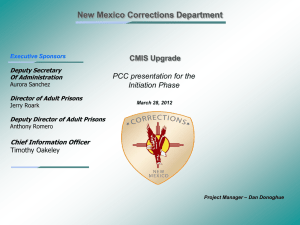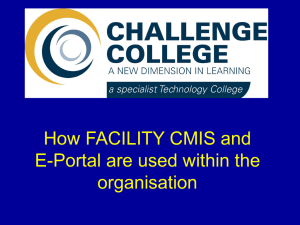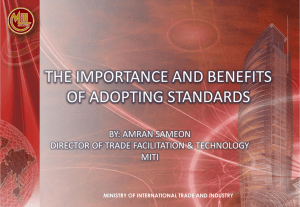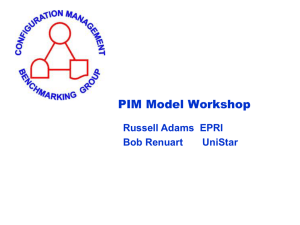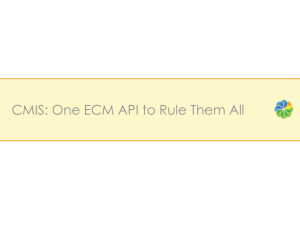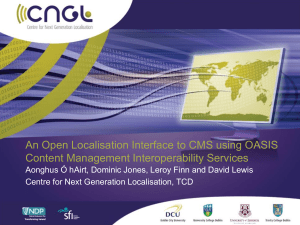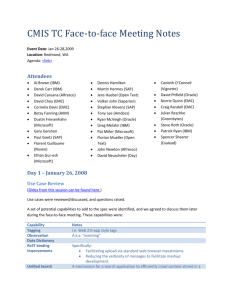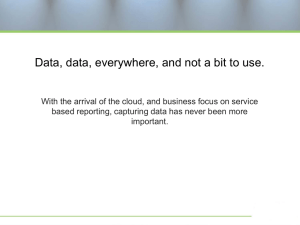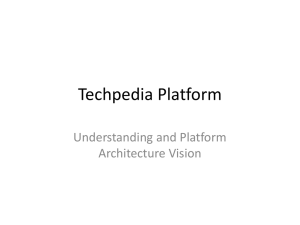Transition to the Data Centric Paradigm
advertisement
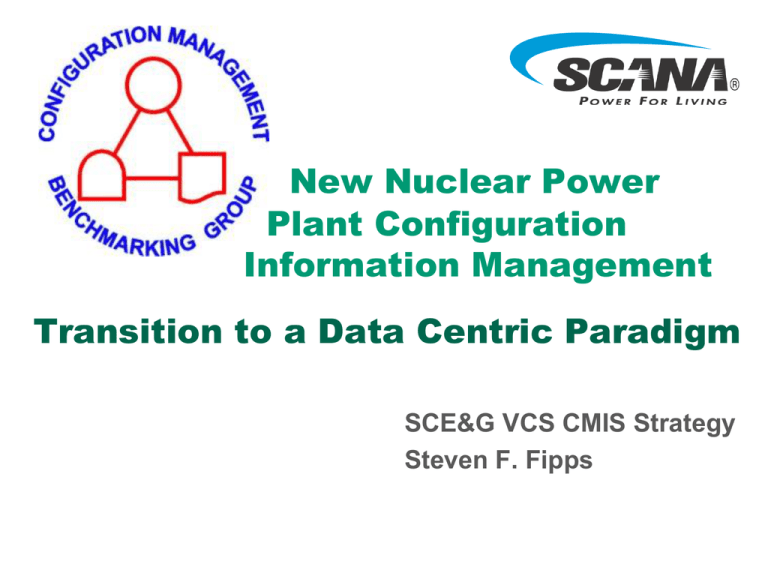
New Nuclear Power Plant Configuration Information Management Transition to a Data Centric Paradigm SCE&G VCS CMIS Strategy Steven F. Fipps Objective Address aspects of implementing an interconnective data centric CMIS, encompassing the entire CM Life Cycle, supporting timely validation of current plant safety, design, and efficient operations 2 Goals 1. Address the vision and planning process for implementation of a data centric CMIS 2. Understand Importance of using established good engineering design practices 3. Comprehend Marketing skills/tools to achieve Senior Staff support and budget allocation 4. Fortify the attributes of dedication, attention to detail, follow-thru, communication, and teamwork in achieving success 3 What is CMIS? An Information Repository that stores Plant Configuration Information in a “Single Source of Truth” 4 UNDERSTANDING CMIS CMIS CMIS 5 CMIS CM TRIANGLE F D D S D D D R W G S S P E C S Requirements Physical Configuration An integrated management program that enables accuracy and consistency Facility Documentation Controlled Processes Maintain Relationships 6 CM HISTORICAL BUSINESS EXAMPLES 1. IEB 79-14 Plant Asbuilt out of synch with Lic & Design Basis 2. NRC GL 83-28 NPP ATWS 3. 1985 NPP Loss of Feedwater Event 4. 1996 10CFR50.54(f) Adequacy and Availability of Design Bases Information 5. 1998 Unapproved At Power Test run by Plant Operators 6. 2011 NRC imposed Inspection Manual Chapter 0350 based on multiple events over several months (Component Failure, fire, and deficiencies in calculations) 7 VCS CMIS Project Background 2007 AP1000 Builders Group development of utility data requirements 2008 began Configuration Management Software discussion with Software Vendors 2008 EPRI new build CM and handover initiatives 2008-2011 Information Gather Trips 2011 Developed Business Case 2012 Senior Staff approval 2012 Presentations by Software Vendors 8 Business Problem Multiple Organizations exchange information. Transactions are primarily paper based Many disconnected data systems The same information exist within multiple applications Different names and meanings for same information Data Turnover format not compatible with Owner use 9 CMIS COST ANALYSIS Efficiencies are gained by reducing the time it takes to: • Coordinate between disciplines, units, etc.. • Perform impact analysis and cost analysis • Research and validate design information • Fulfill regulatory information requests • Track regulatory compliance • Manage and process controlled document revisions • Perform “rework” from having incorrect/insufficient information • Determine the status of processes and manage through “bottlenecks” • Print, route, and track paper files • Maintain software, databases, and software support agreements • Re-verify Preventative Maintenance (PM) Packages 10 CMIS COST ANALYSIS Reviewed current Mod process at Unit 1 Modified an existing Mod resource timeallocating spreadsheet to est, and cal. savings DE Supervision Estimated the reduced effort in hours for each task Calculated the Avg. Eng Mhr saved per Mod Determined the Avg Number of Mods per year Used a conservative rate of $100 per hour for engineering services 11 CMIS COST ANALYSIS DE & PSE Engineering Mhr Cost avoidance by implementing improved CM processes were estimated to be on the order of $5M per year This estimate does not include savings that will be realized by improved CM process in other disciplines: Licensing, Operations, Maintenance, Planning & Scheduling, Procedure Groups, Records & Document Control,… Greatest savings were noted in Database updated, Asbuilt Drawings, and Meetings 12 SCANA CMIS Business Case Instills End-User Confidence that data used reflects the current configuration of the plant Supports Regulatory Part 50 Appendix B requirement to establish CM programs and related design control measures Enhances ability to meet changing regulatory requirements for CM in a timely manner Enhances ability to meet requirements of NRC, INPO, NEI, EPRI, etc... for CM in a timely manner Eliminates maintaining multiple CM databases and documents and the coordination necessary to keep those databases and documents in sync Provides process information for performance indicators and lessons learned Streamlines and integrates Licensing, Engineering, Planning & Scheduling, Operations, Maintenance, Procedures, and Records & Document Control’s CM processes and reduces the amount of paperwork created and maintained. 13 DEVELOPING CMIS I. CMIS Vendor software products are tools II. Ensure Department Input on Functionality and Content III. Design CMIS as Single Source of CM Controlled Data IV. Bound Data Scope to control Data Management Cost V. Structure CMIS to Facilitate Data Turnover from Vendor VI. Develop CMIS in Phases VII. Ensure CMIS is easily Expandable VIII.CMIS implements Plant CM from Const - Plant Ops life 14 HOW IS SCANA DEVELOPING CMIS I. Designate a Core Team that is Empowered to provide input for each Department II. Compile the above Information and Develop a Functional Requirements Spec that will be issued for Bid 15 Core Team Member Responsibilities I. Define Department Data Needs to be Configuration Controlled in CMIS II. Provide input on Data Structure III. Define Functionality Desired from CMIS IV. Define Document/Data Relationship Structure V. Participate in Testing Software 16 Bounding Data Managed in CMIS Managing CM at a Data Level requires additional “overhead” Considerations to determine what is controlled in CMIS: • • • • • • • Importance to Protection of Health and Safety of Public Defines the Design & Licensing Basis Operations Critical - Commercial risk value Multiple application use Frequency of use Contains Data that has no formal controlled database Used in required programs MR, DRAP, EQ, M&TE, ISI, etc Goal is to start with a Compact, high use data set that can be expanded as value is realized 17 Building Relationships Many Document to Tag Relationships are built in the Vendor Plant model. Documents to Tag Relationships created in other tools have to be Manually Created. Document to Document Relationships have to Manually Created. Take Advantage of the EPRI PIM Model Efforts 18 End Results One source of controlled data with multiple attributes that are consumed by multiple applications and changed from one application. Data quality that can be confidently used by all levels of applications by specified milestones. Data and Document Relationships that will build a design basis taxonomy to support configuration control of changes and operability determinations of the plant. Ability to manage as-designed, as-specified, as-built, and as-tested configurations of the plant. Access to data and documents via the 2D and 3D Models Electronic Delivery of Compliant, “as-built” Information for Smarter Operation and Maintenance Satisfied Happy Customers 19 Lessons Learned Start Now – Planning takes years Implement basic DE principles Determine the End Use First Perform Business case early Obtain Senior staff approval and budget Leverage industry expertise (EPRI,INPO,NEI) Incorporate into the initial EPC contract Make IST your best Friend 20 INPUT 21
